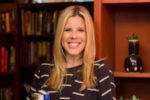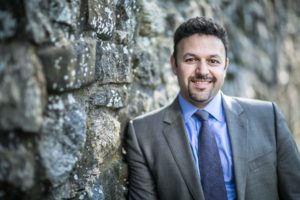By Elizabeth Ireland
Times of San Diego


(Photo: Beth Israel Quarterly)
SAN DIEGO — For Senior Rabbi Jason Nevarez at Beth Israel, the largest Jewish congregation in San Diego and oldest in Southern California, guiding people through the complexities of grief is a sacred responsibility.
“The main thing is presence,” Rabbi Nevarez said. “As a Rabbi, I’m there to bring comfort, to console, to offer guidance on ritual.”
Originally from New York City, Rabbi Nevarez arrived at Congregation Beth Israel at the onset of the COVID-19 pandemic, leading a diverse community of 1,260 families — about 4,000 people.
Over his more than 20 years in the rabbinate, Rabbi Nevarez said he’s never had a person handle mourning similarly. He believes everyone is informed by their unique experiences, relationships, emotional state and mental health.
“My grieving doesn’t look like your grieving,” he said. “I am there to hold space for that and allow people to find their own pathway to healing.”
In Jewish tradition, this recognition of personal grief is supported by rituals that provide comfort and connection at every stage of loss — before a person’s passing, in the moment of transition, and throughout burial and mourning.
“Rituals honor someone who has passed on and are very honoring of who we call the mourner,” Rabbi Nevarez said.
In Hebrew, a mourner is an Avel, referring to a spouse, sibling, parent or child. Out of deep respect for the deceased, the body is never left alone, and a shomer (Hebrew for guardian) keeps watch until burial.
Jewish funerals typically occur within 24 to 48 hours of death. During the burial, family and friends can participate in placing soil onto the casket after it’s lowered into the grave. This symbolizes the body’s natural return to earth, in accordance with Jewish beliefs about the cycle of life and death.
“It’s one of the greatest acts that we can do to honor someone who has passed on,” Rabbi Nevarez said.
After burial, Shiva is observed for seven days, focusing on comforting the bereaved through communal support.
“In Christianity, wakes often happen before the funeral with open caskets, but we do it differently,” Rabbi Nevarez said. “We bury first, then gather to support the family. Mourning is about those who are living, not just those who have passed.”
The Mourner’s Kaddish, in praise of God in honor of the deceased, is recited daily by immediate mourners for a period ranging from a month to a year, with the longest duration observed for parents and children.
“When my mom passed in 2015, I said Kaddish every day for a year, but for any other family member, it’s usually up to 30 days,” Rabbi Nevarez said.
“When we honor a birth, we’re honoring the marker of another year of a person’s life, but when we think about their death, we’re honoring the time that they lived,” he said.
Rabbi Nevarez believes in the soul’s immortality, which offers comfort beyond this life, and sees Jewish tradition as a source of strength that helps people navigate pain and loss.
“My non-Jewish friends say you guys do death and mourning right — you got it down,” he said.
The Rabbi acknowledged that mourning goes beyond death, emphasizing how people can also grieve lost opportunities or relationships that don’t turn out as expected.
Reflecting on his own journey, Rabbi Nevarez shared how the pandemic altered his experience of joining the Congregation Beth Israel community.
“I had to mourn the loss of what I envisioned for my family’s transition to San Diego,” he said. “Accepting that loss was a form of surrender, recognizing that some things are beyond our control.”
Ultimately, Rabbi Nevarez takes deep pride in supporting his congregation through life’s highs and lows.
“One of the greatest honors of being a Rabbi is to be with people in their moments, whether it’s times of joy or sadness,” he said.
“My role is to allow people the space and the grace to grieve and to know that it’s okay,” he said. “There is no playbook.”
*
Elizabeth Ireland is a writer for Times of San Diego, which trades stories with San Diego Jewish World under auspices of the San Diego Online News Association. This is a slightly edited version of her story.